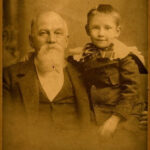The passing of Her Majesty Queen Elizabeth II marked the end of an era, felt deeply across the globe. Among those mourning were the Norwegian Royal Family, who expressed their profound sorrow and condolences to King Charles III and the British Royal Family. This heartfelt response underscored a relationship that has been nurtured and cherished across generations, reflecting a unique bond between the British and Norwegian royal families.
“Our thoughts are with His Majesty The King and the members of the Royal Family on the loss of Queen Elizabeth. For nearly a century, Her Majesty devoted her life to the service of the Commonwealth, following the British people through good days and bad, in times of happiness and sorrow. We also send our condolences to the British people,” stated His Majesty King Harald of Norway, highlighting the deep personal connection and shared history.
A Legacy of Kinship: Tracing the Royal Family Ties
The relationship between the British and Norwegian royal families is not merely one of diplomatic formality; it is deeply rooted in kinship. Queen Elizabeth II and King Harald V were second cousins, sharing a direct lineage through their great-grandparents, King Edward VII and Queen Alexandra. Queen Alexandra, the wife of King Edward VII, was also the mother of Queen Maud of Norway, solidifying a direct ancestral link between the two houses. This shared ancestry has fostered a sense of familial connection that transcends royal duties and state occasions. The understanding of shared heritage and the unique pressures of royal life has undoubtedly contributed to the enduring closeness experienced between members of both royal families.
Queen Elizabeth II and Norway: A History of State Visits
Queen Elizabeth II holds a distinctive place in Norwegian history as the only head of state to have undertaken three State Visits to Norway. These visits spanned the reigns of three Norwegian monarchs – King Haakon VII, King Olav V, and King Harald V – demonstrating the continuity and depth of the relationship over time. Her first State Visit in 1955 was particularly significant as it marked her first official visit to a country outside the Commonwealth after her ascension to the throne in 1952. This choice underscored the importance she placed on the relationship with Norway right from the beginning of her reign. These state visits were not just political events; they were personal interactions between heads of state who shared genuine affection and respect, further cementing the bond between the royal families and their nations.
Shared History and Wartime Bonds: Strengthening Royal Connections
The close ties between the British and Norwegian royal families were further strengthened during the tumultuous years of World War II. When Nazi Germany occupied Norway in 1940, King Haakon VII and Crown Prince Olav were forced into exile, finding refuge in London. This period of exile brought the two royal families even closer together on a personal level. The British Royal Family provided support and sanctuary, forging a bond of solidarity during a time of great adversity. Queen Elizabeth II, then Princess Elizabeth, was a child during this period and personally experienced the Norwegian royals’ presence in Britain. The relationship with King Haakon was particularly warm; she affectionately called him “Uncle Charles,” a nod to his birth name Prince Carl of Denmark (Charles being the English equivalent of Carl). It is even believed that Queen Elizabeth named her eldest son, Prince Charles, born in 1948, in honor of her beloved “Uncle Charles,” King Haakon VII, highlighting the personal affection within these royal connections.
Continuing the Legacy: King Olav and King Harald’s Relationships with the British Royals
The strong relationship forged in earlier generations continued to flourish through King Olav V and King Harald V’s reigns. King Olav, who spent formative years in Britain during WWII, developed a particularly close bond with Queen Elizabeth and the British Royal Family. He was a frequent visitor, notably joining the British royals annually for Remembrance Day ceremonies, honoring the sacrifices of armed forces, a tradition underscoring shared values and respect. King Harald and Queen Sonja have maintained this tradition of close ties, making annual visits to the United Kingdom and the British Royal Family, both officially and privately. This consistent interaction has ensured the relationship remains vibrant and relevant across generations.
This enduring bond extends to the younger generations as well. Just as Queen Elizabeth and King Harald carried forward the legacy of their grandparents, King George V and Queen Maud, so too do their descendants, from Prince George to Princess Ingrid Alexandra. The Duke and Duchess of Cambridge’s visit to Norway in 2018, representing Queen Elizabeth, further exemplifies the ongoing engagement and the future of this special relationship. These interactions, across state occasions and personal visits, demonstrate that the close relationship between the British and Norwegian royal families is not just a matter of history, but a living, evolving bond that continues to connect the two nations.

